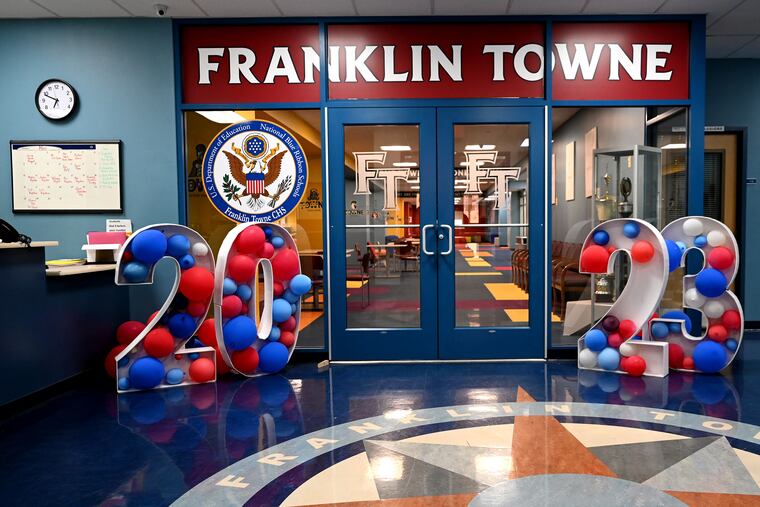Franklin Towne High School allegedly shut out kids of color. An investigation is an important first step. | Editorial
Revoking the school’s charter could take years — and is a decision that must be made judiciously — but the Philadelphia Board of Education made the right choice in beginning the process.

All Philadelphia students were supposed to have an equal shot at admittance to Franklin Towne Charter High School. But allegations that officials manipulated its lottery to keep students from certain zip codes out — limiting the opportunity for children of color to attend one of the city’s top-performing charters — have put the school on the path to possible closure.
While revoking the school’s charter could take years, and is a decision that must be made judiciously, the Philadelphia Board of Education made the right choice when it voted to begin the process and hold fact-finding hearings to investigate the claims of bias in admissions.
As charter school advocates will often remind opponents, charter schools are public schools. They must be held accountable as such.
» READ MORE: Reversing pandemic-related learning loss must be a top priority | Editorial
Franklin Towne, located in Northeast Philadelphia on the Frankford Arsenal grounds, is a National Blue Ribbon School of Excellence winner known for its technologically advanced classrooms and relatively small class sizes. It also boasts a student body whose demographic makeup doesn’t match the neighborhoods it borders, let alone the rest of the School District.
While nearby neighborhoods such as Frankford and Wissinoming have become poster children for decades of white flight, more than half of the school’s students are white (23% are Latino, 12% Black, 8% multiracial, and 2% Asian). That’s almost the exact opposite in a district where around 48% of students are Black.
This is no accident, according to a whistleblower complaint.
Franklin Towne’s chief academic officer, Patrick Field, told The Inquirer earlier this year that certain neighborhoods, schools, and families were being singled out by school leadership. Field claimed that school officials, led by CEO Joseph Venditti, tampered with the school’s admissions lottery, leaving 17 city zip codes shut out entirely.
An Inquirer analysis backed up Field’s claims, finding that the odds of a fair lottery excluding students from all these zip codes were one in one quadrillion.
At the Aug. 17 school board hearing, some Franklin Towne parents and teachers stood up for the school. Many cited its strong test results, while others presented the campus as a welcoming environment for students of all backgrounds, despite the lottery tampering.
Others argued that students should not be punished for the actions of people who are no longer at the school. Venditti, whom Field alleged was behind the manipulation, resigned in February, citing health issues. The threat of revocation does not affect Franklin Towne Charter Elementary School, which operates separately from the high school.
Charter advocates have often claimed that the school board is anti-charter, citing the lack of new charter options despite high demand for the city’s most successful examples. But the lottery issues at Franklin Towne are a good reminder of why the board has been reluctant to put more students in schools where its oversight is limited.
» READ MORE: Mayoral candidates need real plans to fix the city’s troubled schools | Editorial
Even before Field’s allegation, Franklin Towne had a mixed reputation regarding diversity. Students were captured on video, posted to social media, making racist comments during this year’s Black History Month, and the school’s glaring demographic distinctions are nothing new. As school board member Julia Danzy stated at the board meeting, “If I were walking around that school, I would say, ‘Something is wrong here.’”
Nor is this the first time Franklin Towne has dealt with whistleblower complaints. Venditti and Field were sued in 2016, with a former principal alleging the school was a den of patronage and nepotism.
In a city where public education is struggling, no one wants to close off a successful educational option for Philadelphia’s students. However, the principles of public education — meaning an equal opportunity for all who qualify — demand that the school be thoroughly investigated and that its closure remains a possible outcome.